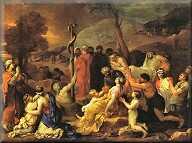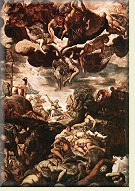|
CHARLES H. SPURGEON SERMON # 1,500 Delivered On The Lord's Day Morning, October 19, 1879 TITLE: LIFTING UP THE BRAZEN SERPENT TEXT: NUMBERS 21:9 |
 |
|
And Moses Made A Serpent Of Brass, And Put It Upon A Pole, And It Came To
Pass, That If A Serpent Had Bitten Any Man, When He Beheld The Serpent Of
Brass, He Lived.
This discourse when it shall be printed will make 1,500 of my sermons which have been published regularly week by week. This is certainly a remarkable fact. I do not know of any instance in modern times in which 1,500 sermons have thus followed each other from the press from one person, and have continued to command a large circle of readers. I desire to utter most hearty thanksgivings to God for divine help in thinking out and uttering these sermons--which have not merely been printed, but have been read with eagerness, and have also been translated into foreign tongues; sermons which are publicly read on this very Sabbath day in hundreds of places where a minister cannot be found; sermons which God has blessed to conversion of multitudes of souls. I may and I must joy and rejoice in this great blessing which I most heartily ascribe to the undeserved favor of the Lord. I thought the best way in which I could express my thankfulness would be to preach Jesus Christ again, and set Him forth in a sermon in which the simple gospel should be made as clear as a child?s alphabet. I hope that in closing the list of 1,500 discourses the Lord will give me a word which will be blessed more than any which have preceded it, to the conversion of those who hear it or read it. May those who sit in darkness because they do not understand the freeness of salvation and the easy method by which it may be obtained, be brought into the light by discovering the way of peace through believing in Christ Jesus. Forgive this prelude; my thankfulness would not permit me to withold it. Concerning our text and the serpent of brass. If you turn to John?s gospel you will notice that its commencement contains a sort of orderly list of types taken from Holy Scripture. It begins with the Creation. God said, "Let there be light," and John begins by declaring that Jesus, the eternal Word, is "the true light, which lighteth every man that cometh into the world." Before he closes his first chapter John has introduced a type supplied by Abel, for when the Baptist saw Jesus coming to him he said, "Behold the Lamb of God which taketh away the sin of the world." Nor is the first chapter finished before we are reminded of Jacob?s ladder, for we find our Lord declaring to Nathanael, "Hereafter ye shall see heaven open, and the angels of God ascending and descending upon the Son of man." By the time we have reached the third chapter we have come as far as Israel in the wilderness, and we read the joyful words, "As Moses lifted up the serpent in the wilderness, even so must the Son of man be lifted up, that whosoever believeth in him should not perish, but have everlasting life." We are going to speak of this act of Moses this morning, that we may all of us behold the brazen serpent and find the promise true, "every one that is bitten, when he looketh upon the brazen serpent, shall life." It may be that you who have looked before will derive fresh benefit from looking again, while some who have never turned their eyes in that direction may gaze upon the uplifted Savior, and this morning be saved from the burning venom of the serpent, that deadly poison of sin which now lurks in their nature, and breeds death to their souls. May the Holy Spirit make the word effectual to that gracious end. I. I shall invite you to consider the subject first by noticing the THE PERSON IN MORTAL PERIL for whom the brazen serpent was made and lifted up. Our text saith, "It came to pass that if a serpent had bitten any man, when he beheld the fiery serpent of brass, he lived." Let us notice that the fiery serpents first of all came among the people because they had despised God's way and God's bread. "The soul of the people was much discouraged because of the way." It was God's way, He had chosen it for them, and He had chosen it in wisdom and mercy, but they murmured at it. An old divine says, "It was lonesome and longsome," but still it was God's way, and therefore it ought not to have been loathsome: His pillar of fire and cloud went before them, and His servants Moses and Aaron led them like a flock, and they ought to have followed cheerfully. Every step of their previous journey had been rightly ordered, and they ought to have been quite sure that this compassing of the land of Edom was rightly ordered, too. But, no; they quarreled with God's way, and wanted to have their own way. This is one of the great standing follies of men; they cannot be content to wait on the Lord and keep His way, but they prefer a will and way of their own. The people, also, quarreled with God's food. He gave them the best of the best, for "men did eat angel's food"; but they called the manna by an opprobrious title, which in the Hebrew has a sound of ridicule about it, and even in our translation conveys the idea of contempt. They said, "Our soul loatheth this light bread," as if they thought it unsubstantial, and only fitted to puff them out, because it was easy of digestion, and did not breed in them that heat of blood and tendency of disease which a heavier diet would have brought with it. Being discontented with their God they quarreled with the bread which He set upon their table, though it surpassed any that mortal man has ever eaten before or since. This is another of man's follies; his heart refuses to feed upon God's Word or believe God's truth. He craves for the fleshmeat of carnal reason, the leeks and the garlic of superstitious tradition, and the cucumbers of speculation; he cannot bring his mind down to believe the Word of God, or to accept truth so simple, so fitted to the capacity of a child. Many demand something deeper than the divine, more profound than the infinite, more liberal than free grace. They quarrel with God's way, and with God's bread, and hence there comes among them the fiery serpents of evil lusting, pride, and sin. I may be speaking to some who have up to this moment quarreled with the precepts and the doctrines of the Lord, and I would affectionately warn them that their disobedience and presumption will lead to sin and misery. Rebels against God are apt to wax worse and worse. The world's fashions and modes of thought lead on to the world's vices and crimes. If we long for the fruits of Egypt we shall soon feel the serpents of Egypt. The natural consequence of turning against God like serpents is to find serpents waylaying our path. If we forsake the Lord in spirit, or in doctrine, temptation will lurk in our path and sin will sting our feet.
What an awful thing it is to be bitten by a serpent! I dare say some of you recollect the case of Gurling, one of the keepers of the reptiles in the Zoological Gardens. It happened in October, 1852, and therefore some of you will remember it. This unhappy man was about to part with a friend who was going to Australia, and according to the wont of many he must needs drink with him. He drank considerable quantities of gin, and though he would probably have been in a great passion if anyone had called him drunk, yet reason and common-sense had evidently become overpowered. He went back to his post at the gardens in an excited state. He had some months before seen an exhibition of snake-charming, and this was on his poor muddled brain. He must emulate the Egyptians, and play with serpents. FIrst he took out of its cage a Morocco venom-snake, put it round his neck, twisted it about, and whirled it round about him. Happily for him it did not arouse itself so as to bite. The assistant-keeper cried out, "For God's sake put back the snake," but the foolish man replied, "I am inspired." Putting back the venom-snake, he exclaimed, "Now for the cobra." This deadly serpent was somewhat torpid with the cold of the previous night, and therefore the rash man placed it in his bosom till it revived, and glided downward till its head appeared below the back of his waistcoat. He took it by the body, about a foot from the head, and then seized it lower down by the other hand, intending to hold it by the tail and swing it round his head. He held it for an instant opposite to his face, and lake a flash of lightning the serpent struck him between the eyes. The blood streamed down his face, and he called for help, but his companion fled in horror; and, as he told the jury, he did not know how long he was gone, for he was "in a maze." When assistance arrived Gurling was sitting on a chair, having restored the cobra to its place. He said, "I am a dead man." They put him in a cab, and took him to the hospital. First his speech went, he could only point to his poor throat and moan; then his vision failed him, and lastly his hearing. His pulse gradually sank, and in one hour from the time at which he had been struck he was a corpse. There was only a little mark upon the bridge of his nose, but the poison spread over the body, and he was a dead man. I tell you that story that you may use it as a parable and learn never to play with sin, and also in order to bring vividly before you what it is to be bitten by a serpent. Suppose that Gurling could have been cured by looking at a piece of brass, would it not have been good news for him? There was no remedy for that poor infatuated creature, but there is remedy for you. For men who have been bitten by the fiery serpents of sin Jesus Christ is lifted up: not for you only who are as yet playing with the serpent, not for you only who have warmed it in your bosom, and felt it creeping over your flesh, but for you who are actually bitten, and are mortally wounded, If any man be bitten so that he has become diseased with sin, and feels the deadly venom in his blood, it is for him that Jesus is set forth today. Though he may think himself to be an extreme case, it is for such that sovereign grace provides a remedy.
- Charles H. Spurgeon
|
